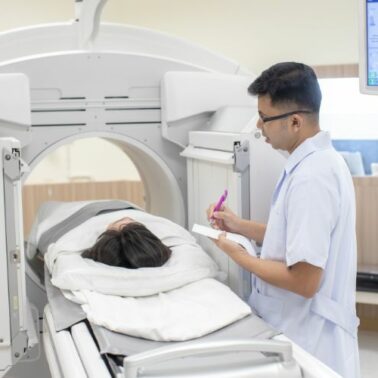
Is Nuclear Medicine Safe?
Nuclear medicine is a groundbreaking way to diagnose and treat a number of health conditions, but it’s natural to have concerns about its safety.
In this article, we’ll ease those worries by giving you a clear understanding of how these advanced procedures are both safe and beneficial. Of course, the best way to ensure safety is by trusting highly trained professionals who specialise in nuclear medicine.
These experts oversee every step of the process, from administering radiopharmaceuticals to interpreting the results. This is what guarantees the utmost level of care and precision.
Let’s dive into the details together.
Common Concerns and Misconceptions
What Patients Need to Know About The Procedure
It’s common for nuclear medicine to make people anxious, especially if they haven’t heard of it. There are all kinds of fears and misconceptions being shared on the internet.
Luckily, all of this can be dispelled with the right information.
Radiation Worries
Many patients worry about the radiation in nuclear medicine. While it does use radioactive materials, the amount of radiation is generally very low. It’s actually similar to the radiation levels of other standard medical tests, like CT scans.
Safety Concerns
There’s a misconception that nuclear medicine is generally unsafe. In reality, it’s a highly regulated and safe procedure. Like other standard procedures, it has very low risks of any significant side effects.
Myth vs. Fact
Some people believe that nuclear medicine is only for serious conditions like cancer, but that’s not the case. It’s actually used for a wide range of diagnoses, from heart disease to bone disorders.
Everyone gets the urge to do some research about the things that make them anxious, and medicine is no exception. However, it’s always best to get your information directly from the experts. Trained medical professionals specialising in nuclear medicine are the best source of credible facts. They’ll make you feel informed and comfortable about the procedure.
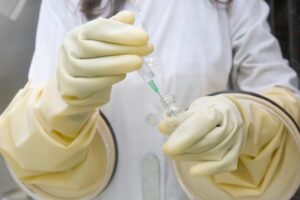
Stringent Safety Measures
Rest assured, nuclear medicine follows very strict protocols that prioritise patient well-being.
Rigorous Protocols
Every nuclear medicine procedure must adhere to strict safety standards. These include the careful calculation of radiopharmaceutical doses and close monitoring of patients throughout the entire process.
Advanced Technology
Nuclear medicine uses state-of-the-art equipment, which plays a crucial role in the procedure’s safety. This technology allows medical specialists to use precise targeting and minimise any unnecessary radiation exposure.
Equipment Maintenance
The equipment undergoes regular maintenance and calibration. This essential routine check ensures that everything operates accurately and smoothly, enhancing the safety and reliability of the procedure.
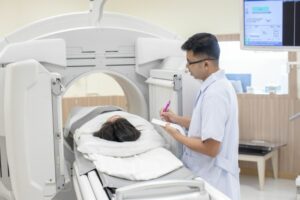
Expertise of Nuclear Medicine Professionals
Nuclear medicine professionals are highly skilled and trained to give you the best possible care.
Qualifications and Training
These experts have specialised education in nuclear medicine, often including advanced degrees. They undergo rigorous training to handle radiopharmaceuticals safely and perform intricate diagnostic procedures.
Accuracy and Safety
Experienced medical professionals are crucial for giving an accurate diagnosis and minimising risk. They precisely calculate and administer the radioactive dose and operate the imaging equipment. With each scan they perform, they do everything they can to ensure it’s as safe and informative as possible.
Real-Life Expertise
Our patients at PRP Diagnostic Imaging often express their gratitude for the detailed explanations that our technologists provide. Our staff bring their professionalism and expertise to every single procedure, keeping things working smoothly and easing any anxiety for our valued patients.
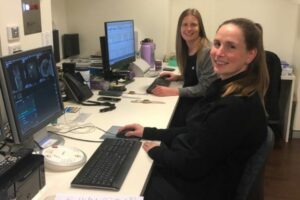
Patient Education and Informed Consent
Educating patients is a key part of the nuclear medicine process.
Understanding The Procedure
It’s crucial that patients understand what their nuclear medicine test involves. This includes what happens during the scan and which radioactive tracer (or radiopharmaceutical) is used, and why.
The Role of Informed Consent
Informed consent is a cornerstone of patient safety in healthcare. Before any radiology test, staff will explain the procedure, including any precautions and potential risks. This ensures that the patient is fully informed before the process begins.
Active Participation
- Ask Questions: Don’t hesitate to ask your doctor for more details about the test and how it will impact your body.
- Understand the Benefits: Ask them how the test will aid in your diagnosis or treatment.
- Follow Pre-Scan Instructions: Adhere to your doctor’s instructions. This will help the scan’s accuracy and safety.
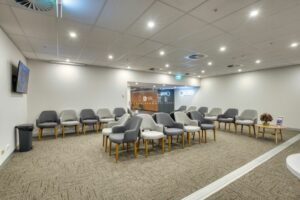
Quality Control and Accreditation
Top-quality care in nuclear medicine involves rigorous quality control and qualifications.
Quality Control
Quality control programs in nuclear medicine are essential. They ensure that every single procedure, from therapy to diagnostic examinations, follows the highest standards. This includes accurate calibration of equipment to precisely measure the energy and activity of radiopharmaceuticals. And remember, while nuclear might be something new and a little scary for you, it is routine for healthcare providers like us! Medicare statistics report that approximately 700,000 nuclear medicine procedures are performed every year in Australia.
Accreditation and Safety
Accreditation by recognised healthcare bodies guarantees that a medical facility meets strict safety and quality guidelines. Physicians and staff must be proficient in various types of procedures, whether it’s for an organ-specific examination like an overactive or underactive thyroid or post-surgery therapy. These are very standard procedures. On average, every single Australian will benefit from at least two nuclear medicine procedures throughout their lifetime.
PRP Diagnostic Imaging’s Accreditations
PRP Diagnostic Imaging proudly holds certifications and qualifications that affirm our commitment to safety and quality. PRP Diagnostic Imaging supports and encourages the active involvement of our doctors at the College of Radiologists (RANZCR) and the Australian Diagnostic Imaging Association (ADIA). Our physicians ensure that every person who visits our practices receives the best possible care with maximum benefit and minimum risk.
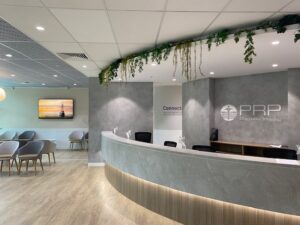
The Safety of Nuclear Medicine: Experts You Can Trust
Nuclear medicine is a safe and reliable type of medical imaging that offers detailed images of the body. PRP Diagnostic Imaging ensures the safety of these imaging procedures through strict measures and the expertise of our trained professionals.
Each step, from the initial booking to the final appointment, is carefully managed to ensure the utmost precision and minimise any discomfort, anxiety, and pain in our patients. You can trust in the safety and reliability of nuclear medicine in the hands of our medical experts. We want you to feel confident about the role of nuclear medicine in your healthcare journey.
Book your appointment with PRP today if you need a nuclear medicine scan. Learn more about our services.
